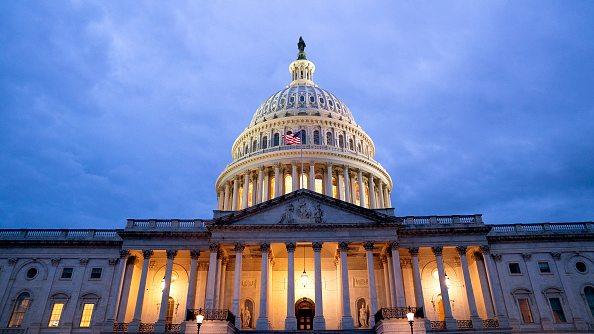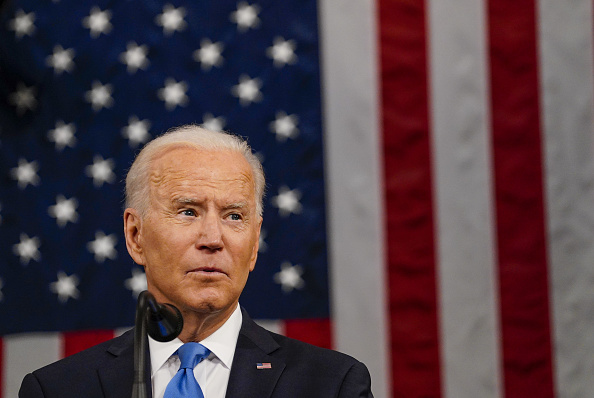
The U.S. Capitol in Washington, D.C., April 29, 2021. /Getty
The U.S. Capitol in Washington, D.C., April 29, 2021. /Getty
Editor's note: Jonathan Arnott is a former member of the European Parliament. The article reflects the author's opinions and not necessarily the views of CGTN.
Watching U.S. President Joe Biden's first joint address to Congress on April 28, my mind couldn't help but wander back to one of the greatest tragedies in British history and a lesson which should have been learned long ago.
In the early 19th century, savvy traders had been importing grain and wheat from abroad far cheaper than it could be produced domestically. The British government of the time enacted the Corn Laws: protectionist policies designed to ensure that no grain cereals could be imported below a fixed price. It was good, initially, for British farmers.
Blocking free trade in this manner had dire consequences. When famine struck Ireland in the 1840s, the Corn Laws prevented new food supplies from coming in. A million died; a million more fled the country, many heading to the United States. Irish heritage within the United States is particularly deep-rooted in American culture for that reason.
As far back as 1817, the economist David Ricardo was warning in his book Principles of Political Economy and Taxation that the repressive Corn Laws were the wrong solution to the problem. He advanced a theory known as Comparative Advantage: that nations prosper when they specialize in the things which they do best and do not fear trade. The Corn Laws provided perhaps the starkest example in history of what can go wrong when governments choose protectionism above trade, one which still resonates within Irish culture to this day.
"There is simply no reason," thundered Biden in his speech on April 28, "why the blades for wind turbines can't be built in Pittsburgh instead of Beijing." As political rhetoric goes, it's a hard-hitting remark. It speaks about protectionism, fighting for jobs for local people in America. In the most bland, technical sense, it's also true (though Biden clearly chooses "Beijing" disparagingly for political purposes rather than Shandong or Guangdong). It's perfectly possible for America to do more of its own manufacturing; the question is whether it's advisable. It's bad economics and incompatible with the rest of Biden's policies for the United States.

U.S. President Joe Biden speaks during a joint session of Congress at the U.S. Capitol in Washington, D.C., U.S., April 28, 2021. /Getty
U.S. President Joe Biden speaks during a joint session of Congress at the U.S. Capitol in Washington, D.C., U.S., April 28, 2021. /Getty
The theory of Comparative Advantage would suggest that the United States has many of its own advantages. Rather than attempt a trade war with China, it would be better to focus on its own strengths as a nation and allow both nations to benefit from free trade.
Biden is, of course, copying the economic protectionism of former president Donald Trump in an attempt to win back the votes of the working class. But the consequence, as night follows day, can only be state subsidies or higher prices. Possibly, the biggest valid criticism of Trump's policies on economics is precisely that: while using populist rhetoric about protecting jobs, he actually increased prices and lowered demand. Jobs in the steel industry were still lost, and higher prices resulted in a knock-on effect.
Biden may be focusing on renewable energy, but ironically his plans could lead to renewable energy being less affordable. Alternatively, he may follow his partisan political interest and do the same thing in the opposite way: through state subsidies paid for by borrowing and tax rises. As the nation recovers from the impact of the pandemic, when there has already been substantial borrowing, such a strategy would have an even larger than usual knock-on effect on the wider economy. Such an "America First" mindset, interfering with free trade, will ultimately cost jobs. It is economic illiteracy.
To compound matters, he's simultaneously asking Congress for a massive increase in the minimum wage to $15 per hour, so that a worker on 40 hours a week would be guaranteed an income of over $30,000 per year. A huge increase in labor costs can result in only two outcomes: either jobs will be lost due to higher wage costs, or it will trigger a substantial rise in the rate of inflation so that the wage increase is not as substantial as it first appears.
Either policy would, on its own, be economically foolish. To attempt to combine both at the same time is reckless. Whether Biden is motivated by an anti-China mindset or domestic policies, either way his recent speech shows him heading in the wrong direction.
(If you want to contribute and have specific expertise, please contact us at opinions@cgtn.com.)

